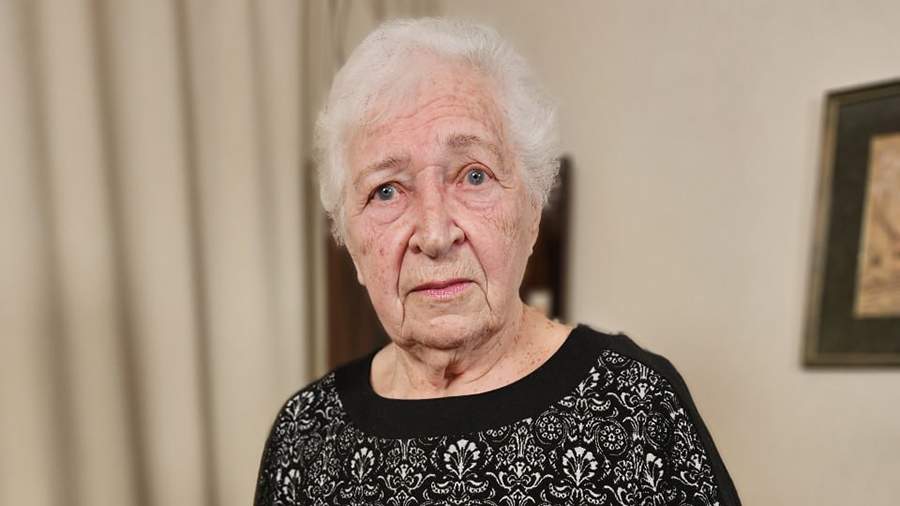Veterans shared details of their lives during the difficult years of the Great Patriotic War
- Новости
- Local news
- Veterans shared details of their lives during the difficult years of the Great Patriotic War

By the upcoming 80th anniversary of Victory on April 18, veterans of the Great Patriotic War continue to share with Izvestia their memories of how they lived during the occupation by the Nazi invaders.
One of the sections of the Izvestia News Center's special project "The Great Victory" is dedicated to the stories of the winners of Nazism.
Alisa Ivanovna Galileeva, born in 1919, who lives in Riga (Latvia), met the outbreak of war when she was not even four years old. At that time, she lived in the Belarusian city of Vitebsk with her parents and older sister.
Her first conscious memories of those years are connected with February 1944, when the inhabitants of Vitebsk began to be massively abducted to Germany. First they were transported in freight wagons to Oldenburg, then to a labor camp in the city of Zande in the north of the country. There was almost no food or water on the way. Many years later, Alisa Ivanovna read a study conducted by local schoolchildren under the guidance of a history teacher, which cited eyewitness accounts.
"Residents of Oldenburg said that when a train with stolen goods arrived at the station and the carriage was opened, corpses fell out first. And only then did those who could still get out appear," Galileeva said.
In a labor camp in Germany, they lived in barracks. The adults worked from morning to evening, the children were locked up all the time. The only "entertainment" for the little girl was the small window of the barracks. A man often passed by him and stopped, looking at the child with regret.
"He was French, he probably has the same child in France. One day, he put a figurine carved from branches or a root on the windowsill, either a horse or a dog," the veteran noted.
By the end of the war, Alice Ivanovna's family was transported to a concentration camp in Bavaria. Her parents had no hope of surviving then. According to her, mom and dad agreed that if they were taken to the firing squad or to the gas chamber, the father would take his eldest daughter in his arms, and the mother — Alice, and so they would all go on their last journey.
However, on May 6, 1945, the prisoners were released by the British. Instead of the German with the machine gun, another man suddenly appeared and opened the door. The jubilation began, everyone jumped out and shouted: "We survived!" That day was their family's biggest holiday. In October 1945, everyone returned to the almost destroyed Vitebsk. At first, they lived against the wall of a broken house under a tarpaulin canopy, then in a damp basement. After some time, my father was offered a job in Riga, and in the spring of 1946 the family moved there.
Nina Egorovna Mosunova, born in 1924, who lives in Kazakhstan, will turn 101 this year. She was born in Tatarstan, into a rural family with many children, where her mother and father had seven of them. Her childhood was a time of famine, and her family was dispossessed. And at the age of 17, she was the only girl from the whole village who was drafted into the army. Nina Egorovna joined the signal corps and became a radio operator.
"She learned everything quickly. She said herself that she was like this when she was a child: "If they tell me, I'll hurt my forehead, but I'll do everything." I also learned Morse code, all these keys," said her granddaughter, Larisa Parechneva.
Nina Viktorovna never liked to remember the war. Even when her grandchildren found front-line photos in her suitcase as young children and asked her to tell them about them, she said sharply: "It's none of your business, you don't need to know." And now, when a veteran talks sparingly about the war, he can't hold back his tears.
Pretty quickly, she was appointed commander of the radio operator's department, in such a position she had to be very strict. He also recalls military buildings dryly.: "They give you a task — sit down, knock on the key. When you're done knocking, leave." When I was working close to the front line, I came under enemy fire several times.
"Then they were fleeing, like cockroaches. Everyone was saving their soul. If you want to live, then move on. If you don't want to live, exhale..." the veteran recalls.
She met the victory in Gorky (present-day Nizhny Novgorod). Moreover, the message about this came by telegraph during her shift. After this news, everyone started dancing and singing. After the end of the war, Nina Egorovna moved to Kazakhstan, got married, and gave birth to a son. She now has two grandchildren and six great-grandchildren.
On April 13, WWII veteran Anatoly Parubin told Izvestia about the capture of Vienna by the Red Army in 1945. According to him, the Germans blew up almost all the bridges across the Danube in the city, but the Soviet soldiers managed to clear the last remaining crossing.
Переведено сервисом «Яндекс Переводчик»

